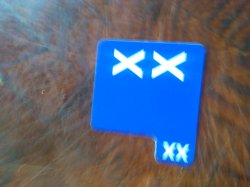
All News
TALES OF AKARANA

BRING IT ON: THE BARELY USED BLUE CARD
When did you last use it? It sits there in your bidding box almost untouched. Compare that to the state of your 1 club card.
However, before we get our blue card out of the box, a tester for you on opening lead… and a bidding problem too.
The lead problem first with you sitting East:
|
|
|
|||||||||||||||||||||
| West | North | East | South |
| 1 ♣ | 1 NT | 2 ♥ | 3 ♦ |
| Pass | 3 NT | All pass |
You may have a bid to show both majors over the 1NT overcall (2![]() is becoming a popular way in this sequence) but essentially, you showed hearts while South showed diamonds and North tried for 9 tricks.
is becoming a popular way in this sequence) but essentially, you showed hearts while South showed diamonds and North tried for 9 tricks.
The bidding problem also has you as East:
|
|
|
|||||||||||||||||||||
North opens 5![]() . What action would you take?
. What action would you take?
The trouble with lead problems is that it becomes evident that the normal lead, ![]() J, does not work. How normal is it? If North had
J, does not work. How normal is it? If North had ![]() Qx or Qxx and your partner had Ax, you would certainly want to lead a heart but swap that
Qx or Qxx and your partner had Ax, you would certainly want to lead a heart but swap that ![]() Q to either declarer or the dummy hand and you will wish you had not led that card..indeed any card in that suit, except for the king. It is not that East has any chance of an entry outside of the heart suit. The
Q to either declarer or the dummy hand and you will wish you had not led that card..indeed any card in that suit, except for the king. It is not that East has any chance of an entry outside of the heart suit. The ![]() K was led at one table with outstanding success:
K was led at one table with outstanding success:
| Board 4 West Deals Both Vul |
|
||||||||||||||||||||||||||||||
|
|
|
|||||||||||||||||||||||||||||
|
|||||||||||||||||||||||||||||||
| West | North | East | South |
| 1 ♣ | 1 NT | 2 ♥ | 3 ♦ |
| Pass | 3 NT | All pass |
At a second table, East was less dramatic but equally successful, in leading a spade.
The declarers who made 9 tricks all received a low heart (or lower than the king) lead. Interestingly, after a low heart lead, declarer can come to 9 tricks by playing ![]() J at trick 2 and only needing one diamond trick.
J at trick 2 and only needing one diamond trick.
Where the ![]() K or a spade was led, North will need at least two diamond tricks and must find the
K or a spade was led, North will need at least two diamond tricks and must find the ![]() J to avoid five losers. Any West who opened the bidding would surely have given the game away. Declarer must win the third round of hearts, cross to the
J to avoid five losers. Any West who opened the bidding would surely have given the game away. Declarer must win the third round of hearts, cross to the ![]() K (or win the initial spade lead in dummy) to play clubs. After setting up three club tricks, North must lead a diamond from dummy and insert the 10 from hand…hardly obvious if West had passed in first seat.
K (or win the initial spade lead in dummy) to play clubs. After setting up three club tricks, North must lead a diamond from dummy and insert the 10 from hand…hardly obvious if West had passed in first seat.
However, we must move on. Your second decision was what to do when North opened 5![]() at favourable vulnerability for them. Would it help your decision to know that North held just a 5 count?
at favourable vulnerability for them. Would it help your decision to know that North held just a 5 count?
Have you got the red double card out? If so, then South may well have a nasty surprise for you!

There is another action which South could take, which could cause you to rethink your initial action:
West North East South
5![]() x 6
x 6![]()
Pass Pass ?
That was the sequence at one table…but East did not believe South….and is still looking for the defence’s second trick.
| Board 9 North Deals E-W Vul |
|
||||||||||||||||||||||||||||||
|
|
|
|||||||||||||||||||||||||||||
|
|||||||||||||||||||||||||||||||
That was no ordinary 5 count, while South had enough for slam to make or to give the opposition a very uncomfortable time in a major (even Deep Finesse concedes 800 in 5![]() x). 5
x). 5![]() xx making with an overtrick is a nice crisp “four figure score” (1000) just beating the score for an undoubled small slam (920). A redoubled 6
xx making with an overtrick is a nice crisp “four figure score” (1000) just beating the score for an undoubled small slam (920). A redoubled 6![]() costs you 1380, for future reference.
costs you 1380, for future reference.
So, that blue card got a bit of an airing at one or two tables this week. Rarely could there have been a hand more suited for it!
Richard Solomon
Go Back View All News Items
